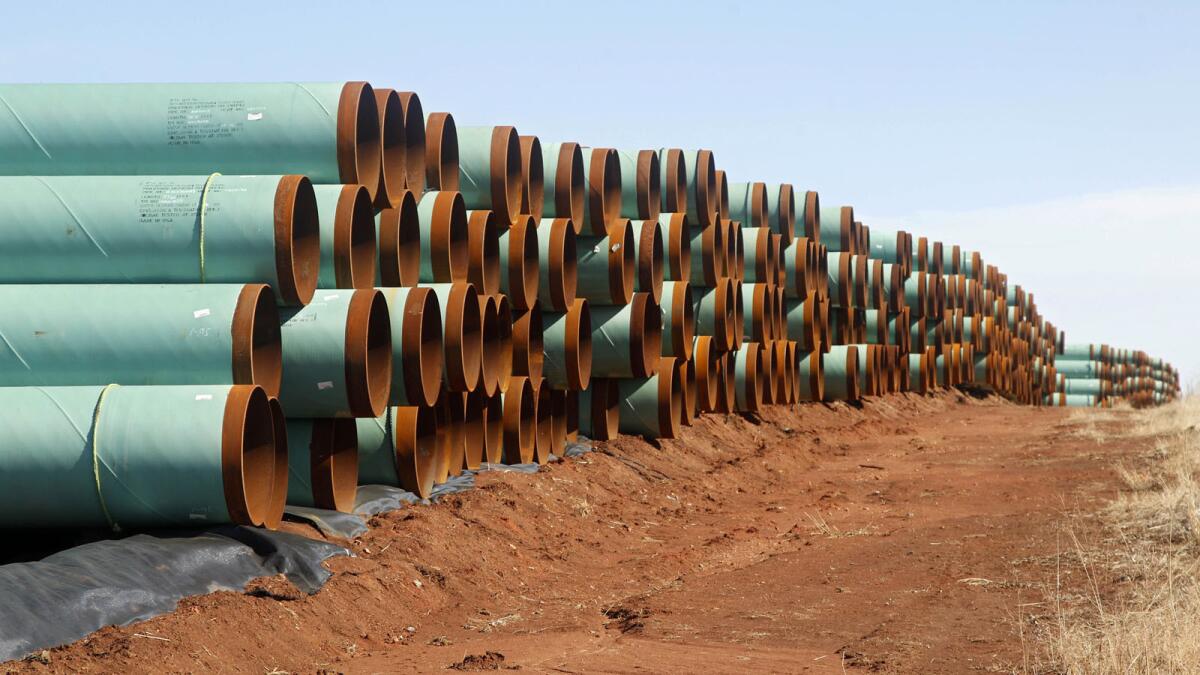Keystone XL pipeline may no longer make economic sense, experts say

Reporting from Washington — Amid the shouting on Capitol Hill, the wads of campaign cash and the activist careers shaped around the Keystone XL pipeline, the project at the flashpoint of America’s energy debate now confronts a problem bigger than politics.
It may no longer pencil out.
As Congress’ six-year obsession with Keystone nears a climax, plunging oil prices have industry analysts questioning whether the plan to link Canadian tar sands with Gulf Coast refineries still makes economic sense.
It is now possible that pipeline backers could win their hard-fought battle for political approval yet never build the project.
With the GOP about to take control of both houses of Congress, backers of the pipeline say they are close to having a veto-proof majority for a bill that would order the Obama administration to give the project the federal permit required for pipelines that cross a U.S. border.
But “the political debate is not paralleled by the realities” in the market, said Sandy Fielden, director of energy analytics at Texas-based RBN Energy. “The economics of this project are becoming increasingly borderline.”
The problem is that extracting oil from tar sands is difficult and costly. Prices need to be relatively high to make the extra effort profitable.
For pipeline boosters, market conditions have turned gloomy as world oil prices have dropped to the lowest point in five years.
By some estimates, the price of oil already has dropped below what investors in Keystone would need to break even, and some analysts believe further drops are in store.
“The recent decline in [oil] prices has to give the sponsors some pause,” said Chris Lafakis, a senior economist at Moody’s Analytics.
The prospect of abandoning the pipeline is something its Canadian builders and their supporters in Congress say they won’t even entertain. Keystone is a decades-long investment that backers of the project say will not be changed by what they portray as a temporary glut in the oil market.
“We sign binding, long-term commercial agreements with our customers so they can reserve space to deliver the crude oil they need to their customers,” Mark Cooper, a spokesman for TransCanada Corp., which would own the pipeline, wrote in an email.
The oil shippers investing in the pipeline, Cooper wrote, “have a good understanding of what the market needs over time. They do not make decisions based on short-term views or changes in commodity prices.”
But some independent analysts say that’s overly optimistic, especially after Saudi Arabia announced over Thanksgiving that it will not slow its oil production in the face of declining prices, as it has often done.
Plunging prices have put oil firms around the world under stress, placing smaller operations in danger of bankruptcy. Canadian firms were already under pressure from the boom in production by the U.S. shale-oil industry; the Saudi move squeezed them further.
The market shift has put TransCanada in the position of a real estate developer vying to build a skyscraper during the depths of the mortgage crisis. And while the Keystone investors are big enough to endure years of losses on the pipeline, that was never their plan.
Even at the Manhattan Institute, a free market-oriented think tank with little patience for the arguments made by pipeline opponents, questions are emerging about whether Keystone still deserves star billing in the energy debate.
“I’m for cheap, abundant, reliable energy. Period,” said Robert Bryce, a senior fellow at the conservative group. “This is not ideological. This is about what the economics say.… The project is clearly very challenged right now.”
“The symbolism has outstripped the reality,” Bryce said. “Both sides have decided we are going to fight over this, regardless of the big picture now emerging with oil prices.”
The change of fortune is ironic, coming after the pipeline has proven itself resilient in the political arena. Keystone was a prominent bogey man in the unprecedented, enormously costly and ultimately unsuccessful campaign that California billionaire Tom Steyer bankrolled on behalf of Democrats in the midterm elections.
Steyer’s inability to prevail in most of the midterm races in which he spent money gave the pipeline additional currency in Congress.
Republicans say they will push for approval of the pipeline when they take full control of Congress in January, regardless of market conditions. Sen. Jim Inhofe (R-Okla.), a longtime crusader for the project, said the pipeline’s diminishing potential in the energy marketplace is beside the point.
“Oil prices and prices at the pump should have no bearing on support for an approval of the Keystone XL pipeline,” he said.
The Obama administration, Inhofe said, has used the permitting process “as a political game and is simultaneously preventing American businesses from pursuing a project that would aid economic opportunity.”
Matt Badiali, an oil industry analyst at Baltimore-based Stansberry Research, said he suspects the pipeline ultimately will get built. But he said he is confounded by the continued hype around Keystone, which he said would do nothing to help keep down the price of energy in the U.S.
------------
FOR THE RECORD
Dec. 16, 9:40 a.m.: An earlier version of this article misspelled the name of the firm where oil analyst Matt Badiali works as Stransberry Research. It is Stansberry Research.
------------
“It has just become something for the two sides that have been disagreeing for however many years to keep hammering on each other,” he said.
Twitter: @evanhalper
More to Read
Sign up for Essential California
The most important California stories and recommendations in your inbox every morning.
You may occasionally receive promotional content from the Los Angeles Times.












